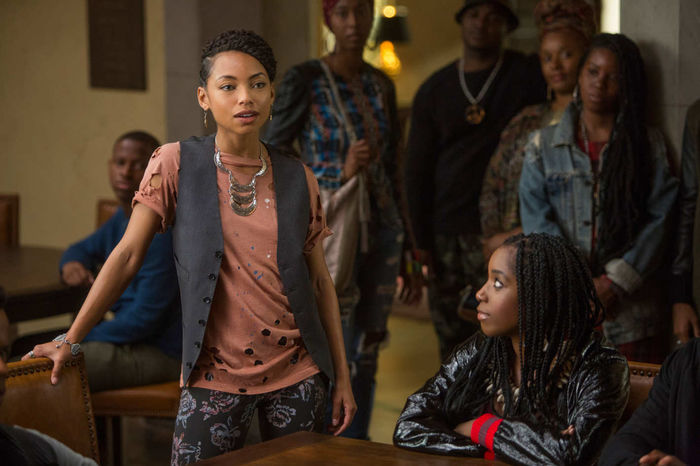Surrogacy, Sacrifice, and Survival: ‘Little Fires Everywhere’ and its Complicating of Motherhood
Rianna Davis reviews the newest prestige series starring Kerry Washington and Reese Witherspoon.

Under clearly enigmatic circumstances, Mia Warren, a Black artist, and her daughter Pearl, arrive in quaint, all-American Shaker, Ohio. Elena Richardson, a Stepford Wife-like figure, rents a property to the two of them, and the lives of the Warrens and the Richardsons are quickly entangled. Pearl, welcomed to the town by Elena’s son, Moody, is quickly swept up into the charm of it all, and meets Moody’s other siblings in what seems a perfect 90s sitcom set up: the cuter older brother, Trip, the self-absorbed big sister, Lexie, and the black sheep of the family, Izzy.
"With this idea of surrogacy, too, we see how identity comes into play"
But there is a constant undercurrent of tension in AmazonPrime's new series Little Fires Everywhere. Something doesn’t quite sit right. The series, a serialised adaptation of the novel by Celeste Ng, perfectly grapples with the complexity and racialisation of motherhood. What immediately stands out is the structure of Elena’s motherhood, and how she has assumed this as her primary identity. Aside from Izzy, her kids fit neatly into her idea of motherhood: “putting the needs of your children before your own.” With her meticulously cultivated image she is a perfect and dangerous antagonist, precisely because she’s not aware of the threat she poses, and all too aware of it at the same time.
Mia is a stark juxtaposition; Pearl has never enjoyed a stable home, which is what immediately attracts her to the glittering exterior of the Richardsons. But survival is a feeling Mia knows well, and when her instincts as a mother, but most importantly as a Black woman, are engaged, she takes up a job working in the Richardsons’ home to be able to watch Pearl and protect her from the white upper-class family. Mia and Elena both become surrogates to the other’s child, however unwittingly. Pearl is taken with the Richardsons and finds in Elena that which she is most desperate for: affection. Izzy, the outcast, clings to Mia as a mother figure, a fellow artist who recognises her as who she is, the resident non-conformist who constantly seeks to break free from her mother’s repressive structure.
"This characterisation (of “women like her”) highlights the problem with such narrow and colonial understandings of womanhood"
With this idea of surrogacy, too, we see how identity comes into play; Lexie, Elena’s eldest daughter, falls pregnant to her Black boyfriend. Her and Brian’s relationship is somewhat fraught because Lexie steals Pearl’s experience of racism for being denied entrance into an AP class and rewrites it into one of sexism for an application to Yale. When she goes to the abortion clinic with Pearl, the only other person who knows about her pregnancy, Pearl is horrified when the doctor calls out “Pearl Warren” for the registered patient. Lexie sheepishly looks back at Pearl, not embarrassed that she has assumed her identity (as she has before) but simply caught; she thinks only of her reputation, assigning Pearl as the ‘surrogate’ of both her pregnancy and her shame. This assumption of identity happens constantly, and in doing so, erases the original identity.
Ultimately, this brings into question the idea of abandonment. In the show, abandonment is not only literal. Izzy, the youngest daughter who Elena has punished for being unwanted, is emotionally stranded amongst her siblings, and Elena does nothing to resolve this, only making this divide worse. But she sees provisions as adequate; her children live in a nice house, attend a good school, and have bright futures ahead. Elena puts the onus on Izzy to fit in, abandoning her because “it’s hard to be [her] mom.” The emphasis throughout, even after the perfection of her family unravels beneath her nose is on the morality of her character. “I’m a good person,” Elena tells her husband when he criticises her for being a bad mother. And for Elena, being a good person is synonymous with being a good mother, for that is what she has characterised herself as. This characterisation (of “women like her”) highlights the problem with such narrow and colonial understandings of womanhood.
This is hardly an exhaustive synthesis, and it goes without saying that one should watch this show. Reese Witherspoon’s portrayal of Elena Richardson so perfectly evokes the White Woman figure who imagines herself progressive because she refers to Blacks as “African-Americans” and has risen on the back of her own hard work to where she is now. Kerry Washington’s interpretation of Mia equally paints a stunning picture of the complexities and intricacies of motherhood as a Black woman, in a constant tug of war with her past, and truths she has not come to terms with fully. In conversations about (Black) liberation, we too often cling to binarised and heteronormative notions of family and motherhood, when instead we must reject these notions, especially since they are racialised in essence and inherently exclusionary of so many. ‘Little Fires Everywhere’ wonderfully problematises these ideas and challenges us to move beyond these definitions.
 News / Judge Business School advisor resigns over Epstein and Andrew links18 February 2026
News / Judge Business School advisor resigns over Epstein and Andrew links18 February 2026 News / Gov grants £36m to Cambridge supercomputer17 February 2026
News / Gov grants £36m to Cambridge supercomputer17 February 2026 News / CUCA members attend Reform rally in London20 February 2026
News / CUCA members attend Reform rally in London20 February 2026 News / Union speakers condemn ‘hateful’ Katie Hopkins speech14 February 2026
News / Union speakers condemn ‘hateful’ Katie Hopkins speech14 February 2026 News / Hundreds of Cambridge academics demand vote on fate of vet course20 February 2026
News / Hundreds of Cambridge academics demand vote on fate of vet course20 February 2026










